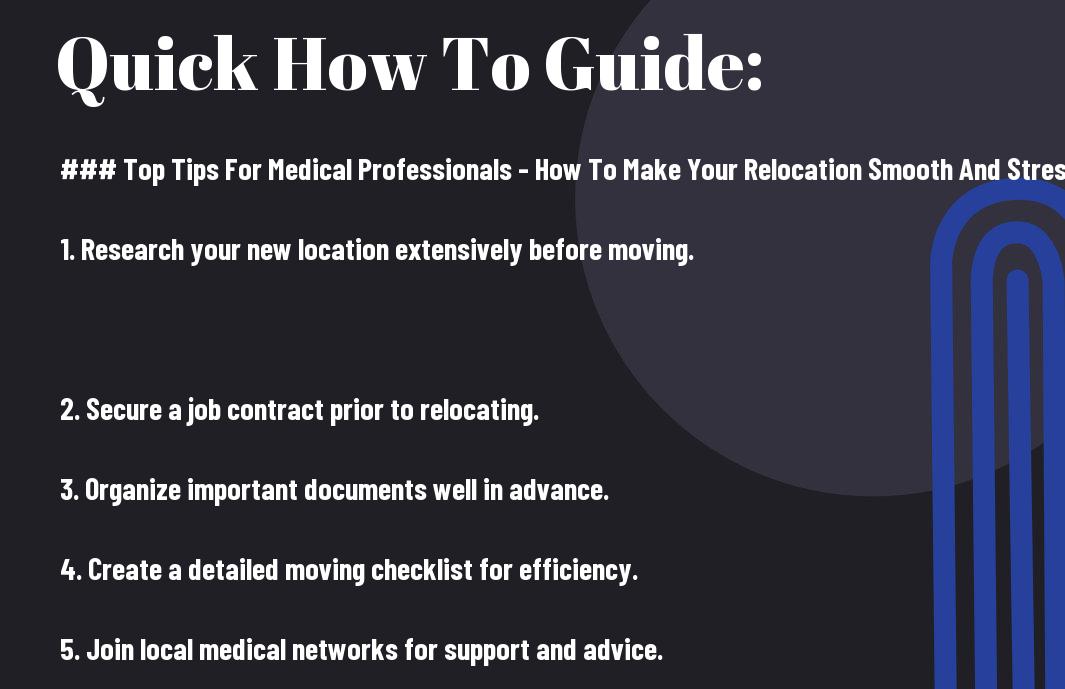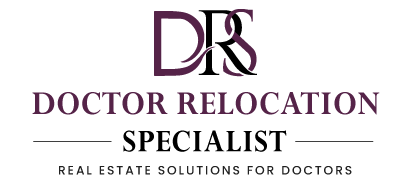Over the years, relocating as a medical professional can present unique challenges, but with the right strategies, you can ensure a seamless transition. Your focus should be on planning, organization, and knowing what resources are available to you. In this guide, you’ll discover important tips to make your move easier, from navigating licensure requirements to settling into your new community. By employing these tactics, you can alleviate much of the stress associated with relocating, allowing you to concentrate on what truly matters—caring for your patients.

How-To Prepare for Your Relocation
The key to a smooth relocation is thorough preparation. Start by making a checklist of tasks to accomplish before your move, including notifying your current employer, arranging housing, and planning for the logistics of moving your belongings. Begin this process well in advance to alleviate any last-minute stress and help you focus on the exciting changes ahead.
Researching New Locations
For a successful relocation, spend time researching potential new locations. Consider factors such as the cost of living, local amenities, and the work environment in healthcare settings. Connecting with local practitioners through professional networks can help you gain insight into the area’s healthcare landscape and community dynamics, making your transition smoother.
Understanding Licensing Requirements
Now is the time to familiarize yourself with the licensing requirements in your new location. Each state has different regulations and processes for obtaining the necessary certifications, so it’s important to understand how they apply to your specific profession.
Plus, obtaining your license may take weeks or even months, so ensure you start this process early. Check the state’s medical board website for detailed information, including application forms and any continuing education requirements. Joining local medical associations can also provide guidance and resources to navigate licensing hurdles effectively, ensuring you’re ready to practice once you arrive.
Tips for Finding Housing
Any relocation can pose housing challenges, but with the right approach, you can secure a suitable place. Consider the following tips:
- Research neighborhoods that fit your lifestyle and work location.
- Utilize real estate websites and apps to explore options.
- Seek recommendations from colleagues or local contacts.
- Attend virtual or in-person open houses to get a feel for places.
Perceiving the importance of convenience and comfort will guide your housing decision-making process.
Short-Term vs. Long-Term Options
There’s a significant difference between short-term and long-term housing options. Short-term rentals may serve you immediately upon relocation, but if you’re staying put for a while, investing in a long-term lease can provide stability and a sense of home.
Involving Family in the Decision
Short-Term housing solutions can be helpful but including your family in the decision-making process is equally important. Discuss their needs and preferences to ensure everyone feels comfortable with the new living situation.
Family involvement can transform your relocation experience. Engaging your loved ones in discussions about potential neighborhoods, schools, and amenities ensures that their voices are heard. This collaboration can alleviate anxiety and foster a supportive environment as you navigate the transition, making it a more enriching experience for everyone involved.

How-To Navigate the Job Market
Once again, tapping into the job market as a medical professional requires a strategic approach. Start by researching healthcare facilities and organizations in your new area, examining their values, culture, and specialties. Engage with local job boards, professional associations, and attend career fairs dedicated to healthcare to increase your visibility and connect with potential employers. Tailoring your resume and cover letter to each opportunity will help you stand out and clearly showcase your skills and experience to future employers.
Networking Strategies
Even though relocating can feel overwhelming, effective networking is a powerful tool to ease your transition. Reach out to your professional contacts, including former colleagues and mentors, as they can provide insights into the job market and introduce you to local professionals. Attend workshops, seminars, or local meet-ups related to healthcare to expand your network. Online platforms like LinkedIn also offer opportunities to connect with professionals in your new area and gain insights into job openings.
Utilizing Recruitment Agencies
There’s a wealth of support available through recruitment agencies that specialize in the healthcare sector. These agencies not only have extensive job listings but also possess valuable industry knowledge that can enhance your job search. They’ll work closely with you to match your skills with suitable positions, saving you time and effort in the process.
Market demands often drive job openings, and recruitment agencies are well-versed in current trends. They can provide insights into which specialties are in high demand and guide you in positioning yourself effectively. By utilizing their expertise, you can tap into opportunities that align with your career goals and experience, streamlining your job search during your relocation. They can also offer interview preparation and ongoing support, making your transition smoother.

Factors to Consider for Family Transition
For a seamless relocation, it’s necessary to evaluate all aspects that can impact your family’s transition. Consider the following factors:
- Housing and community integration
- Healthcare facilities and services
- Social connections and support networks
- Safety and crime rates
- Local cultural activities
Perceiving these elements will enhance your family’s adjustment and well-being in the new environment.
Schooling Options for Children
Schooling is a primary concern when relocating with children. Research the educational institutions available in your new area, focusing on their curriculum, extracurricular activities, and ratings. Make sure to consider factors such as the school’s proximity to your new home and whether it offers programs tailored to your child’s specific needs.
Spousal Employment Opportunities
Options for your spouse’s employment can significantly impact your family’s transition. Understanding the job market in your new location will help you identify opportunities that match their skills and interests.
Employment availability can vary widely by region, so it’s advisable to network through professional associations and local job forums. Consider the field your spouse is in, as some areas may offer more roles than others. Additionally, exploring remote work options that allow flexibility could broaden possibilities significantly. Engaging in local community events may also help your spouse in making connections that could lead to employment.
How To Manage Finances During a Move
After securing your new job and making relocation plans, it’s vital to manage your finances wisely to ensure a smooth transition. This will involve outlining your budget, understanding various costs, and seeking out potential financial support to ease the burden. By planning ahead, you can navigate the financial aspects of your move with confidence.
Budgeting for Relocation Costs
Budgeting is about assessing all potential expenses associated with your move. This includes hiring movers, transportation, temporary housing, and any moving supplies you may need. By creating a detailed budget, you allow yourself to allocate funds appropriately, ensuring that unexpected costs won’t derail your financial stability during this transitional phase.
Finding Financial Assistance Programs
Costs can quickly add up during your move, which is where financial assistance programs come into play. Many organizations and associations understand the challenges that come with relocating, particularly within the medical field. They often provide grants, low-interest loans, or relocation reimbursements to help ease your financial load.
Finding these programs requires research but can lead to significant savings. Explore resources offered by professional associations, governmental agencies, or even your new employer. Many healthcare institutions have relocation assistance built into their hiring packages. By taking the time to find available options, you can alleviate some financial stress and focus on settling into your new environment.
Tips for Settling In
To make your transition seamless, consider the following tips for settling into your new environment:
- Familiarize yourself with local amenities and services.
- Take time to explore your neighborhood.
- Join local groups or organizations in your field.
- Engage with coworkers and seek out mentorship opportunities.
After taking these steps, you’ll find it easier to adapt and thrive in your new setting.
Community Engagement
Settling into your new location is enhanced by actively engaging with the community. Attend local events, farmers’ markets, or social gatherings to meet residents and build connections. Volunteer opportunities are a great avenue to connect while giving back, allowing you to feel rooted and establish a sense of belonging.
Establishing a Support System
You should focus on establishing a solid support system as you settle in. This involves identifying friends, colleagues, and local resources that can provide assistance or companionship during your transition. Actively seek out professional networks or groups that align with your specialties to create a safety net of contacts.
Engagement with your peers and community members can significantly enhance your support system. Attend workshops, conferences, and social events where you can meet others in your field. Consider joining local healthcare associations, which not only offer networking opportunities but can also provide valuable resources in your new environment. Ultimately, fostering these connections will make your relocation experience less overwhelming and more enjoyable.
Summing up
With these considerations in mind, you can navigate your relocation as a medical professional with greater ease and confidence. By planning ahead, researching your new environment, and connecting with local healthcare networks, you can ensure a smooth transition. Don’t overlook the importance of personal well-being during this process; prioritize self-care and seek support when needed. Your new journey awaits, and taking these steps will help you settle into your new role and community seamlessly.

